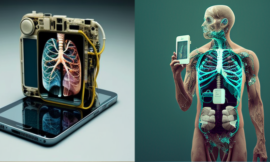Technology has played a vital role in improving health in many ways. From diagnostic tools and treatment options to patient care and communication, technology has revolutionized the way healthcare is delivered and has made it possible for more people to access the care they need.
One of the most significant ways that technology has impacted health is through the development of diagnostic tools. Medical imaging, such as X-rays and MRI, have allowed doctors to identify and diagnose diseases and injuries in a non-invasive way. Genetic testing has also become more prevalent, allowing doctors to identify genetic predispositions to certain diseases and tailor treatment plans accordingly. These advancements have not only increased the accuracy of diagnoses but also have made it possible to detect disease in the early stages, which increases the chances of successful treatment.
In addition to diagnostic tools, technology has also played a significant role in the development of new treatment options. Advances in pharmaceuticals and biotechnology have led to the creation of new drugs and therapies that can effectively treat a wide range of conditions. Robotic surgery, telemedicine, and other innovative technologies have also made it possible for doctors to perform complex procedures with greater precision and less invasiveness. These new techniques have not only increased the success rate of the treatments but also have reduced the recovery time, making it possible for patients to return to their normal life faster.
Another important aspect of technology in healthcare is its ability to improve patient care. Electronic health records (EHRs) have become increasingly prevalent, allowing doctors to easily access patient information and track progress over time. This has not only improved the coordination of care but also has made it possible for doctors to review a patient’s medical history, which can help them make informed decisions about treatment. Telemedicine has also made it possible for patients to receive care remotely, which is especially beneficial for those in rural or underserved areas. This has increased access to healthcare for people who live in remote areas or have mobility issues.
Communication is another area where technology has had a significant impact on healthcare. With the rise of social media, patients can now easily connect with other patients and share their experiences and knowledge. Online forums, support groups, and other resources are also available, providing patients with a wealth of information and support. This has not only increased the patients’ knowledge about their condition but also has provided them with emotional support, which can be crucial for their recovery.
In order to make the most of the benefits of technology in healthcare, it is important to ensure that it is used in an ethical and responsible manner. As technology continues to evolve, it will be crucial for healthcare providers and policymakers to ensure that it is used in a way that maximizes the benefits for patients while minimizing any potential harms. This includes ensuring patient privacy, data security, and preventing the misuse of technology.
In conclusion, technology has played an essential role in improving health by providing diagnostic tools, treatment options, improved patient care, and communication. It has increased access to healthcare and has made it possible for more people to receive the care they need. It has also increased the success rate of treatments and has reduced recovery time. It is crucial to ensure that technology is used in an ethical and responsible manner to maximize the benefits for patients.







